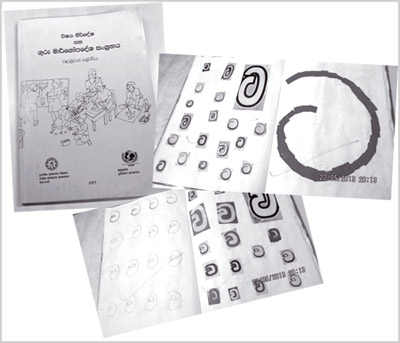|
First graders overloaded with homework:
Post assessment survey of Grade One syllabus, a must
By Manjula Fernando
"Why has teacher to give me so much homework Amma?," Every time my
five-year-old who is in Grade One asks me this question I fumble for a
fitting answer.
 For us in the good old days, Grade One meant having fun in school
besides attempts to learn and write the Sinhala alphabet and numbers.
And at home it was play, play, play, all day long. Most of our time in
school was spent in the play area, where I got my first permanent scar,
due to a deep cut on the leg while trying to ride a broken 'see-saw'.
Even our formal learning mostly took place on the school ground. For us in the good old days, Grade One meant having fun in school
besides attempts to learn and write the Sinhala alphabet and numbers.
And at home it was play, play, play, all day long. Most of our time in
school was spent in the play area, where I got my first permanent scar,
due to a deep cut on the leg while trying to ride a broken 'see-saw'.
Even our formal learning mostly took place on the school ground.
Although much has been written about the GCE Ordinary Level and
Advanced Level exams and syllabi, there is very little said and written
about the primary education. There is no doubt that ours is one of the
best in the world but are the parents satisfied?
Ground breaking education reforms were introduced after many years of
research in 1998 and the syllabi was once again updated in 2007. But no
amount of work will reap the best results if the implementation is
faulty. It still remains a question whether the grade one and two
syllabi put to practice in the classroom is actually consistent with the
National Institute of Education (NIE) norms.
Grade one children are overloaded with homework. The first graders in
state schools have to spend at least two hours a day, on average, doing
homework. This is besides spending four and half hours or more in
school, doing mostly 'desk work', a concern shared by every parent.
If homework involves hand work, such as making a playhouse, a kite, a
yoghurt-spoon dynamo or a balloon doll, the stakes are that a full three
hours will be needed, specially if the child is in a bad mood. Homework
time turns out to be the worst time of the day for a child and an
exasperating experience for the parent - with one trying her best to
keep the teacher happy and the other trying to flee.
Even the handwork assignments seem too advanced for a five-year-old
and often parents end up completing these 'take-home tasks'. At the end
of an exhausting day they will be more than happy to get it over with
and stop the child being punished. The last thing you think of is to
complain of homework overload.
Then, what is the use of giving homework? Will they reach the
competency levels stipulated in the teacher guidebook of NIE (revised in
2007). Is it compulsory for 'Grade one' students to have books and books
full of home work? Is this what the revised syllabi expected? A teacher
trainer says 'No'.
The guidebook stipulates that the teaching methodology for Grade one
should consist of play and activity with minimum time allotted to desk
work. The time has come to carry out a post assessment survey to take
stock of the situation at ground level.
 The trainer said the 1997 syllabi under the Education Reforms program
was again revised in 2007 to simplify the Grade 1-2 syllabi to make it
more child centred and child friendly. The trainer said the 1997 syllabi under the Education Reforms program
was again revised in 2007 to simplify the Grade 1-2 syllabi to make it
more child centred and child friendly.
"The objective is to minimise book based learning to activity based
learning. But the teacher is central to making it actually work," she
said.
But what does really happen in the classroom? Parents lament their
children are burdened with desk work and homework. Some suggest along
with the teacher guides and the syllabi, teachers' perceptions and
attitudes need to undergo drastic changes for the children to reap real
benefits from our primary education system.
Over-ambitiousness and competition among teachers, specially in
leading and popular schools, too is a strain on primary students. At
their tender age, it is of no consequence to the child if his class is
ahead of the one next door. Their only struggle is to comprehend the
basics of their immediate environment.
Parents face a dilemma - should they complain to the teacher of the
burden on their child or just get into the bandwagon. Once when a parent
actually tried to talk about it, the abrupt answer from a teacher had
been, "if you feel there is too much homework I will give your child
less, if it suits you". The parent recoiled fearing consequences on his
child.
Home work for Grade one students consist of writing pages of Sinhala
letters, writing two or three-letter words, drawing pictures for
Religion or Environmental subjects, pasting small squares of varnished
paper on a 'page-size' letter and filling a page with printed letters
(to fill one page you need 15- 25 big letters and cut up an entire
newspaper, think of the amount of paper going to waste). You are bound
to get more than two of these assignments per day, five-days-a-week and
more homework on Fridays.
A co-worker of mine said the most offensive request came when the
class teacher asked all children to bring a bird's nest for the
environment lesson the following day. It was more of a demand than a
request. Since the teacher had a reputation of being harsh on those who
disobey, almost all students turned up with different sizes and shapes
of birds' nests, even a nest of a weaving bird.There was talk at the
school gate that the birds' nests were on sale in book shops since it
has been part of the syllabus for sometime. Does it teach our kids to
protect the environment or rather become poachers?
A teacher trainer refuted it, saying that the syllabus does not
compel students to bring such material to school but that is not the
reality. May be the syllabus has been misinterpreted but no one has
cared to correct it.
A grade one student is between five and six years of age and some of
them can barely express themselves even in their mother tongue. It is an
open secret that most schools still practice corporal punishment on the
first graders as well.
A cane wielding teacher is still a common sight even in popular
schools in Colombo. Why parents don't complain is a complex issue.
There are so many questions we need to answer. Why a child who can't
wait to go to the 'big school' from Kindergarten, shows evaporated
enthusiasm after just a few days of schooling; Why most grade one
students enter school as if they are being taken to the dungeons; Why
they dread incomplete homework?
Indeed there are many who give their heart and soul to educate the
next generation to be worthwhile citizens. But yet the larger picture is
not so rosy.
School has to be a happy place for every child. What should to be
done to make it so? |


